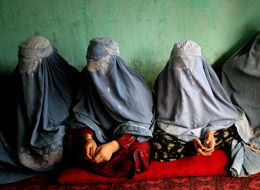According to Naomi Wolf in the Huffington Post, past detainees at Guantanamo Bay and CIA "black sites" are prohibited from sharing their experiences with the public for fear of releasing classified information. Since most of these detainees have been tortured, we are therefore prevented from hearing the deeds committed in our name by our government.
There is something essentially against our identity as Americans and freedom-loving people in what is going on here. A person's own experiences, even though experienced against his will (or particularly because of this) should be part of individual free expression. He has the right to tell it, and we have the right to hear it - it is his experience of torture. We should be able to hear what is being done in our name. It is shameful that a democracy suppresses evidence of its own misconduct. I don't believe this is what America stands for.
Read the Article at HuffingtonPost
Saturday, October 31, 2009
Wednesday, October 28, 2009
Israel Supreme Court: Open 'apartheid' road to Palestinians
Update from an earlier post, where I commented on the "separate but unequal" regime emerging between Palestinians and Israeli settlers on the West Bank. Now, the Christian Science Monitor reports:
Israeli Supreme Court: Open 'apartheid' road to Palestinians: "Israel's Supreme Court ordered a segregated West Bank highway to be opened for Palestinian use. But rights groups say 10 more 'apartheid' roads should be opened too.
In the first ruling of its kind, Israel's Supreme Court ordered the Israeli army on Thursday to allow Palestinians to travel on a West Bank road they had been banned from using.
"The Supreme Court never made a decision before relating to a particular place where Palestinians are banned from driving on a road just for being Palestinians," said Nirit Moskovich of the Association for Human Rights Israel (ACRI), the group filing the case on behalf of 22 Palestinian villages south of Hebron. ACRI is disappointed, however, that the Supreme Court did not seize the opportunity to make a ruling on segregated roads in general, she added.
Israeli Supreme Court: Open 'apartheid' road to Palestinians: "Israel's Supreme Court ordered a segregated West Bank highway to be opened for Palestinian use. But rights groups say 10 more 'apartheid' roads should be opened too.
In the first ruling of its kind, Israel's Supreme Court ordered the Israeli army on Thursday to allow Palestinians to travel on a West Bank road they had been banned from using.
"The Supreme Court never made a decision before relating to a particular place where Palestinians are banned from driving on a road just for being Palestinians," said Nirit Moskovich of the Association for Human Rights Israel (ACRI), the group filing the case on behalf of 22 Palestinian villages south of Hebron. ACRI is disappointed, however, that the Supreme Court did not seize the opportunity to make a ruling on segregated roads in general, she added.
"Too Big To Fail" Bill Unveiled By Treasury Department, House Dems

It seems that something may finally be done about the systemic risk posed by huge financial institutions. If a corporation is too big to fail, it either shouldn't exist or should pay the price for its failure. Incentives should be in line with the desired outcomes! I'm skeptical that this particular legislation will be successful in fully fixing the problem, however. It is better than doing nothing, but our political system is so highly penetrated by financial and business interests that even moderate legislation will keep from getting watered down later when the spotlight is off. There is no doubt in my mind that in a few years, when attention is diverted elsewhere, quiet lobbying efforts will result in eventual watering down of any remaining teeth in the measure that it will be worthless. After all, this is how we got into this mess in the first place. Look at the history of financial deregulation and other relatively unnoticed moves in Congress starting in the mid-1990s. (Yes, both parties can take the blame here.) Around $5 billion spent on lobbying by financial firms paid off handsomely, with the ability to engage in predatory lending free from enforcement, massive consolidation, lowered capital reserve requirements, and near unfettered freedom to create and sell complicated new financial products that no one understood - just to name a few. (see report at www.wallstreetwatch.org/soldoutreport.htm)
My pessimistic warning: unless we watch Washington like hawks, it will happen again!
Read the Article at HuffingtonPost
Monday, October 5, 2009
What Do Muslim Women Want?

Naomi Wolf makes an important point in her post: Western women (and men) tend to automatically associate Muslim women's head covering with oppression. In fact, the issue is much more complicated than simply defending or attacking the "hijab" - as it is called in the Arab world. What women wear is often much less important than obtaining real, concrete rights and achievements: freedom from "honor killings" and arbitrary divorce, the right to child custody and support, the ability to choose husbands and complete their educations. While her point is important, she is still only giving us one small part of the story. The struggle for women's rights does not take place only in the palaces of the Arab world and among the super-educated former CNN journalists. It also takes place daily among the washerwomen and secretaries and non-employed mothers struggling to make choices within the constraints of deteriorating economies, growing Islamist influence, and (occasionally) less-than-supportive male relatives. As one who has lived for extended time in the Arab world and spent much of my time in middle class and lower-middle class neighborhoods, I support Wolf's position but urge her to look beyond the tiny slice of upper crust intellectual life she encountered.
Read the Article at HuffingtonPost
Subscribe to:
Posts (Atom)





